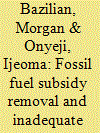| Srl | Item |
| 1 |
ID:
124477


|
|
|
|
|
| Publication |
2013.
|
| Summary/Abstract |
This paper provides an insight into consumer engagement in smart grid projects in Europe. Projects analysed are those included in the catalogue annexed in the JRC Report "Smart Grid projects in Europe: lessons learned and current developments". The analysis suggests an increase in the interest in consumer engagement projects at European level and a strong focus on the residential sector, and emphasises the key importance of public funding to support these projects. The study also reveals that projects involving consumers are characterised by the pursuit of two main objectives: gaining deeper knowledge of consumer behaviour (observing and understanding the consumer) and motivating and empowering consumers to become active energy customers (engaging the consumer). The paper reviews the main activities undertaken to obtain these objectives and highlights trends and developments in the field. Finally, the paper discusses obstacles to consumer engagement and the strategies adopted by the projects surveyed to tackle them, highlighting the need to build consumer trust and to design targeted campaigns taking into consideration different consumer segments. The conclusions are in line with findings and analyses presented in the literature and underscore the need for further research and action at European level.
|
|
|
|
|
|
|
|
|
|
|
|
|
|
|
|
| 2 |
ID:
113410


|
|
|
|
|
| Publication |
2012.
|
| Summary/Abstract |
We briefly consider the impact of fossil fuel subsidy removal policies in the context of inadequate power supply, with a focus on the implications for businesses. In doing so, we utilize the case of the early 2012 fuel subsidy removal in Nigeria. The rationale for such subsidy-removal policies is typically informed by analysis showing that they lead to an economically inefficient allocation of resources and market distortions, while often failing to meet intended objectives. However, often the realities of infrastructural and institutional deficiencies are not appropriately factored into the decision-making process. Businesses in many developing countries, already impaired by the high cost of power supply deficiencies, become even less competitive on an unsubsidized basis. We find that justifications for removal often do not adequately reflect the specific environments of developing country economies, resulting in poor recommendations - or ineffective policy.
|
|
|
|
|
|
|
|
|
|
|
|
|
|
|
|